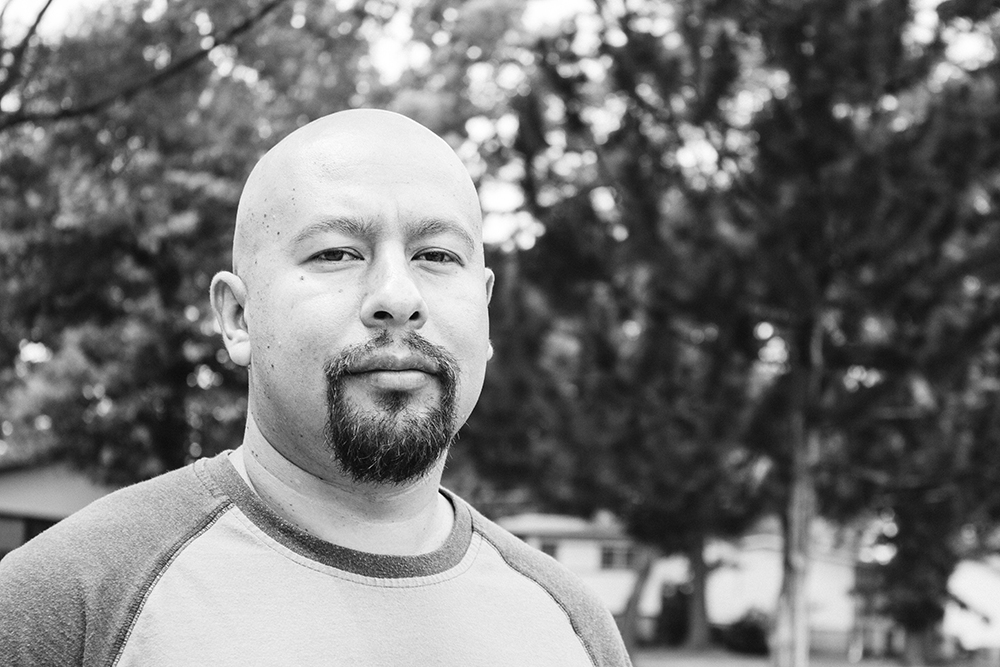
Translation: Confession
Share:
Radio Ambulante is supported by the Sara & Evan Williams Foundation and Panta Rhea.
Angel González: There are a lot of gaps, things that I don’t remember. But what I do recall is that they took me out of the car, handcuffed me, and put me in front of the lights of the patrol car. From there, they took me to the police station.
Daniel Alarcón: This is Angel González, a Mexican man that was accused of raping a woman in Waukegan, Illinois, north of Chicago. He was arrested the same day as the crime. And remained there, in prison, for years.
Angel: And I think you never adapt to being in that place. You always have to be on alert, looking out for yourself. But, like I said, in my case, it was more serious. They see you as…you’re the worst of the worst in prison, so to speak.
Daniel: Welcome to Radio Ambulante, I’m Daniel Alarcón. Our producer Silvia Viñas spoke with Angel and tells his story.
Silvia Viñas: In the summer of 1994, Angel was 20 years old. He was going out with a girl, Karina.
Angel: We had plans to get married. I had already spoken to her family to ask for permission. So we were just waiting for the right time to plan everything out.
Silvia: They had gone to visit Karina’s sister, Myrna, the night of July 10th. They watched a movie, talked…until it was time for Angel to drop Karina off at her house.
Angel: And I remember that when we left the apartment, there were some…police cars outside.
Silvia: Myrna got worried after seeing the patrol cars. But Angel and Karina had to leave, so the two of them left the parking lot in Angel’s car–a ’79 black Cadillac with tinted windows.
Angel: After I dropped her off at her house, I was going to my house and that’s when the police stopped me.
Silvia: The officer, gun drawn, made him step out of the car. He handcuffed him and put him in the backseat of the patrol car. Angel didn’t understand why he was being arrested.
The arrest was based on the description of his car: an old sedan, dark, with tinted windows. It was the description given by a woman that lived in the same building as Myrna. The woman had been raped that same night, a few hours earlier.
Before telling you more about the crime, you have to know this: Angel doesn’t remember all the details from that night. It happened over 20 years ago and he’s tried to forget it. So the details that I’m going to share with you come from the official briefing prepared by his lawyers.
On July 10th, 1994, some time between 9:15 and 10:00 PM, two men kidnapped a 35-year-old woman.
The woman had arrived home about five minutes before being abducted. She entered her second floor apartment, turned on the light, and started to listen to the messages on the answering machine.
The buzzer rang and thinking it was a friend, she pressed the button to open the front door of the building. No one came up, so she decided to go down just in case the buzzer was broken.
Through the front door window, she saw the silhouette of two men. She thought it was her boyfriend and his friend, so she opened the door. But on the other side, she encountered two strangers. The men grabbed her, put her in a car, and took her to a backyard where they raped her.
The woman, disoriented and distressed, started walking to try to find help. Finally, she made it to a store after midnight. She was crying uncontrollably. The police arrived and after helping her to calm down a bit, the victim gave an account of the attack.
Her description of the assailants was very general: two Hispanic men, around 25 years of age, average height and weight, with dark hair. And she described the car in which she had been abducted as an old sedan, dark, with four doors, and tinted windows. Yes, just like Angel’s.
The victim’s boyfriend had arrived at the apartment and had already spoken with police; he already knew the general description of the car and of the assailants. So when he saw Angel’s car leaving the parking lot, he immediately told the police that he didn’t think that car belonged there. The police tried to go after Angel, but couldn’t reach him. They wrote down the license plate number of the car, and a little later, arrested him.
While Angel was waiting in the backseat of the patrol car, other officers brought the victim to the scene of the arrest so that she could identify Angel and the car. When the victim arrived…
Angel: I remember that they took me out of the car and put me in front of the headlights of the patrol car.
Silvia: The police had him stand in front of the car where the victim was sitting. The headlights shined on him. His hands were cuffed behind him. The victim, from the backseat, identified him as one of the two men that had attacked her.
The victim, in her initial description, hadn’t included facial hair, or any kind of distinguishing mark on the faces of her attackers. At the time, Angel had a goatee and a birthmark under his right eye. Moreover, the victim had said the assailant was a few centimeters taller than her–but Angel was shorter. The only part of the description that Angel matched was being Hispanic and having dark hair.
But what mattered to the police in that moment was that the victim had identified him. So the policeman put Angel back in the patrol car and took him away.
In the police station they removed his clothes and made him wear a paper jumpsuit. He was detained for the rest of the night, but wasn’t able to sleep. And his English was very limited.
Angel had arrived to the United States about 6 years earlier, when he was 14. He’s the oldest of four siblings and came to the United States to be with his father. But at 15, he started to live on his own.
Angel: Because of that I probably felt a little freer, because I was able to survive, I felt like, okay, I can do what I want. I felt like an adult.
Silvia: In the years before his arrest, Angel worked at restaurants, factories…He lived for a while in California where he worked harvesting grapes. But he never went to school, and because of that, when they arrested him, his English was limited.
The morning after his arrest, around 10:00 AM, they started to interrogate him. The case was assigned to two detectives: Artis Yancey and Lou Marquez. Marquez spoke Spanish, but it was Yancey that started to interrogate him–in English.
They questioned him in a small room. He had been there for 9 hours and hadn’t slept in more than 24 hours.
Angel didn’t have a criminal history. The interrogation began with him affirming his innocence. Yancey told him that the victim had identified him as one of the attackers and started to describe the crime. This is Vanessa Potkin, the lead counsel for Angel’s case.
Vanessa Potkin: Well, that’s a problem right there. If you’re the officer, you can’t start describing the crime to the person you’re questioning because now it’s like, are the details that you ultimately get coming from what you said to the person or from the person?
Silvia: Vanessa works for the Innocence Project, a non-profit organization that helps people who have been wrongly convicted. She told me there is no video of the interrogation, which is why we don’t know exactly what happened in that room. There are only a few reports from that day and what was said at trial. The detectives admitted to some things. For example, that Yancey had given Angel details of the crime.
Angel told the detectives what he had done that night, giving specific information about Karina and Myrna, but the detectives didn’t investigate these statements.
Vanessa Potkin: And the officer even admitted there was nothing that could’ve changed his mind. They believed he did it and the purpose of the interrogation and questioning wasn’t to get to the truth, it was to get him to confess.
Silvia: According to Yancey’s statements, the decisive moment was when they told Angel that they had two witnesses and evidence that showed he was lying, which wasn’t true.
Marquez took Yancey’s place and started to interrogate Angel in Spanish–it was already 1 to 1:30 PM. He had been detained for 12 hours. Marquez asked Angel to write a statement.
Desperate for them to let him go and thinking that during the trial he would be able to prove his innocence, Angel wrote something short, with few details. In his statement, he said that he had picked up a friend, went to Myrna’s apartment building, and when the victim came out, they grabbed her and took her to a park and raped her. First him and then his friend. He says that afterwards, he dropped off his friend and returned to Myrna’s house where he was until 12:15 at night. Nothing more. He doesn’t give any more details.
But Marquez also wrote a statement, a much longer one in English. It was assumed to be a translation of Angel’s confession, but it was different.
Angel: I wrote about three lines and he made it a lot longer, saying it in his own words because in reality, I didn’t know anything.
Silvia: The statement that Marquez wrote included facts that didn’t match with the victim’s testimony. For example, Marquez’s report says that the men grabbed the woman and that she tried to scream, so they covered her mouth. But the victim never said she screamed or that they had covered her mouth while they put her in the car. The victim stated that they raped her in two different places. But in Marquez’s statement, only one place is mentioned: the park that Angel mentions in his confession–which, by the way, is not one of the two places where she said the attack had occurred.
Around 4:30 or 5 in the afternoon–7 hours after they had taken him to the interrogation room–a video was filmed showing Angel signing the statement that Marquez had prepared.
Angel: I thought I’ll write whatever, leave, and then go to court. I’ll go to court and face the judge, the victims–whatever happened..isn’t what happened.
Silvia: Before the trial, the evidence, such as the woman’s clothes, were examined in a lab. But the only DNA sample they obtained matched that of the victim. During that time, they used a now obsolete system that required a large sample to get results. In any case, the state of Illinois asked the lab to keep the evidence samples.
Angel was in a local jail in pre-trial detention. Meanwhile, his mom and three siblings were still in Mexico. Maria, his mother, didn’t know what had happened.
She was waiting for Angel to write to her. But nothing came. One day, Maria was about to send him a letter when she ran into a neighbor that began to talk to her about Angel.
María González: And she says to me, “You don’t know what happened?” “Ay! What happened to him?” “Ay, no, if you don’t know,” she says…“Now I won’t say anything.” “You’re going to tell me right now! What happened?” She said, “ay,” then says, “they arrested him.” “And when did this happen?” I had this sinking feeling. And then I went back home crying.
Silvia: Her husband hadn’t told her about Angel because he didn’t want to overwhelm her. One of her daughters had recently undergone a throat operation, she had spent days without eating. But for Maria it was clear that she had to go to Illinois to see Angel. So in December, four months after his arrest, Maria went to the United States.
María: At least it felt good to see him. But at the same time, it was awful to see him locked up.
Silvia: During the next six months, Maria visited him every weekend.
In July of 1995–almost one year after his arrest–the trial began. Angel maintained his innocence. Myrna, Karina, and two friends testified in support of his version of what he had been doing the night of the crime.
Angel: And they didn’t believe them. They said: “You’re his friends”…so once again, they didn’t do their jobs, they didn’t investigate. They just relied on: okay, he signed this paper, made this video, that’s enough for a conviction. And that’s how it went. They used all of it against me.
Silvia: The sentence was delivered on his birthday.
Angel: That was the day, that was my present, so…I’ll never forget.
Maria: I felt so sad, I felt like I was going to die there.
Silvia: Angel was found guilty for aggravated assault and kidnapping. His sentence: 55 years in jail.
Angel explained how complicated it was to go to prison after the sentence:
Angel: It’s dangerous to go there with this kind of case. You have to always be alert, looking out for yourself. You can’t trust anyone. It’s prison. So, you never really adapt. But, like I said, in my case, it’s worse because they see you as…you’re the worst of the worst, so to speak.
Silvia: Angel understood why they saw him this way. For him, it was difficult knowing rapists, and not only because he knew they had committed that crime, but because when he met them he thought:
Angel: Perhaps you were the one that committed this crime and that’s why I’m here; or I’m here because of someone like you. So it’s hard to control your emotions sometimes.
Silvia: In that first prison–because afterwards, he spent time in 4 others–he met Old T. He was an older prisoner that was in charge of the prison’s law library.
Angel: And because I explained my case to him, he told me, “Hey, there’s this organization. When you want, I can write to them. Tell me and I’ll help you fill out the form.”
Silvia: That organization was the Innocence Project. To get in touch with them first he had to fill out a form and send it in through mail. Angel first passed on all of the files he had from his case to Old T.
Angel: I showed him the transcripts and court papers I had, and he looked them over. In two days he said, “Yeah, there’s a lot of problems with your case.” He said, “I’m not a lawyer, but I know how this works and if you want…” and that was when he said to me, “and if you want, we’ll fill out the paperwork.”
Silvia: He had spent two years in jail. With the help of Old T, Angel sent a letter to the Innocence Project and waited for a response.
Years can pass before the Innocence Project is able to take on a case. At that time, the organization was flooded with requests. And now it isn’t much different. Vanessa Potkin told me that they receive around 250 letters each month and have more than 6,000 cases in review process . Sometimes it can take more than 10 years to open a case.
Four more years passed, but in 2001, with the help of a private lawyer hired by his parents, Angel requested another DNA test. The technology had improved a bit, and the laboratory had kept the evidence from the case. In that test, they were able to identify the DNA of one man. And it wasn’t Angel. But the crime had been committed by two men. So even though the DNA didn’t match with Angel’s, it didn’t clear him–he could still have been the second attacker.
His parents had spent a lot of money on lawyers, but none of them was able to help him.
Angel: Sometimes you start to get a little frustrated because in reality, you don’t know how the system works. So when I read law textbooks and thought I understood, they told me, “No, it doesn’t work like that.” I met with someone that knew the laws and they tried to explain it to me and to help. I used to say that I had to do it myself, nobody else was going to do it for me.
Silvia: So Angel dedicated himself to studying.
Angel: Until one day, I was tired of not understanding. I had to go to school and that’s when I started to change a little bit, to help myself using those books. I couldn’t stay ignorant for the rest of my life.
Silvia: First, he finished high school through a prison program. Then, he asked to be transferred to a prison where he could study a trade and take construction classes, cleaning classes, maintenance classes. And he also started to work as a volunteer in different prison programs.
He also started to paint in those years.
Silvia: What did you paint?
Angel: Landscapes, animals, drawings that came to mind once in awhile. There isn’t enough material there. But it’s something that really helped me relax. It also helped me a lot to feel free in my mind, to put it that way. It brings you…it brought me to another world.
Silvia: In 2012, 15 years after he had written to them for the first time, the Innocence Project wrote to Angel and said:
Angel: “We looked at your case and we’re going to help you.” For me that was like, “Wow, the door just opened again.” Just knowing that this prestigious organization was going to take up your case and help you was such a big thing. And so they asked me questions: “Do you want us to do it? Because if you are guilty, then it’s going to affect you,” and I told them, “No, on the contrary, what do you need? Do it as fast as you can.”
Silvia: Angel’s case wasn’t unique in Lake country. Under one state’s attorney in particular, Michael Waller, there were several notorious cases of wrongful convictions.
News Bulletin: Juan Rivera was sent to jail when he was 19 years old. He says he had to become a man in the worst place possible, hell itself.
Silvia: Juan Rivera, for example, was a Puerto Rican man that spent 20 years in jail. They convicted him three times for the rape and murder of an 11-year-old girl. Three times. His lawyers say the police forced a confession out of him after interrogating him for four days. DNA testing finally showed that it wasn’t him. And there are several cases like that one.
The worst part is that even in cases when DNA testing showed that someone was innocent, the local officials fought to keep the convictions. State’s attorney Michael Waller retired at the end of 2012 and a new state’s attorney, Michael Nerheim, was elected. Neirheim has an entirely different view on DNA testing and wrongful convictions.
The Innocence Project contacted Neirheim to tell him they wanted to test the DNA from Angel’s case. In less than a month, the new prosecutor had responded to them saying that he would allow them to do the tests.
In May of 2013, they started to do the tests. The lab obtained evidence from the victim’s shorts and a tampon that was found at the scene of the crime. The DNA they found on the shorts and the tampon was consistent: they were from the same man. And it wasn’t Angel.
The lab also examined semen found on the victim’s shorts. The DNA profile came from another man, the second attacker. And it wasn’t Angel either.
Vanessa called Angel on a Friday to tell him the good news.
Angel: And she told me, “The results came back and everything went really well.” I was so happy. But she said, “It’s still not over yet, there are things that can hold us back or they can ask for more time. But you’ll go to court on Monday.”
Silvia: Vanessa says that when she spoke to Angel over the phone and told him everything, she immediately noticed a change in his tone of voice. After so many years, he finally knew he was close to being free.
On Monday, March 9th of this year, 2015, three days after receiving the good news, a judge in Lake County reversed Angel’s conviction based on the DNA tests that proved his innocence.
And that Tuesday night, after 20 years, he got out.
News Bulletins: Tonight, Angel Gonzalez of Mexico was given back his freedom…For a crime he didn’t commit. He believes that his inability to defend himself properly in English had something to do with his arrest and conviction… “If words were enough I’d say I’m sorry, and I am sorry,” affirmed state’s attorney Mike Nerheim, “and though it sounds trivial, after spending 21 years in jail, it’s important you know we work hard along the Innocence project for justice to be served.”
Angel: The lawyers from the Innocence Project came to pick me up from prison. It was very foggy that day. They had to drive really slowly. The first thing they asked me was: what do you want to eat? And I told them: “A chicken sandwich…a grilled chicken sandwich.” They stopped at a new restaurant that I didn’t recognize.
Silvia: The prison was two hours away from his parent’s house, but that night, with the fog, the trip took almost three hours.
What did you talk about in the car?
Angel: Well, we were just listening to music. They kept reminding me, “You’re free now, what you gonna do?” Things like that.
Silvia: Meanwhile, his family was waiting for him at his parent’s house.
Maria: I opened the door and saw they stopped here when they arrived. They let him out and I couldn’t help myself! With all that joy and happiness, I went to give him a hug. I couldn’t stand to wait for him to come in!
Silvia: Once inside, he met the rest of the family: his father, his brothers, his nephews.
Angel: There were so many relatives that I didn’t even know. In reality, I had no idea what to say. It came as a shock. It was like, “Okay, is this real?”
Maria: Everyone hugged him and held him. He said, “Wow, I don’t even know who they are.” He felt overwhelmed, you know? He was alone for 20 years and then he saw so many family members he didn’t even know.
Silvia: It hasn’t been easy for Angel to readjust to life outside of prison.
Angel: Sometimes I still wake up and open my eyes: “I’m free!” Other times, there’s this fear of falling asleep as if it were a dream and I’m going to wake up in prison. Suddenly, I start panicking, “Okay, what am I doing? or what am I doing here?” There are still days when I have problems adjusting, but I think it will pass…like everything, it just takes time. Maybe it take me the rest of my life to readjust.
Silvia: Maria notices that Angel has been doing better. He’s getting closer to his family and has a lot of plans: he wants to continue his studies, he wants to travel, and he would like to work as a car mechanic. He still can’t work. His visa expired while he was in prison. For now, while he fixes his immigration status, he works as a volunteer walking dogs in Chicago.
And though he hasn’t been painting like he used to in prison, he has plans to start doing it so soon.
In his parent’s house, where I interviewed Angel, there is a painting that hangs by the door. It’s a painting he did in prison.
Angel: In my mind, it’s a small river with grass on the side, some trees. Maybe there’s an eagle flying by. That’s what I imagine as being free, to be far from everything, away from the bad. Just nature. I used to try to imagine a quiet place, alone, far away, something that would bring me some peace.
Silvia: Angel hasn’t heard anything about the victim that identified him as one of her attackers more than 20 years ago. She hasn’t gotten in touch with him. But Angel doesn’t feel resentment because for him:
Angel: She’s the real victim. With all this she had to go through this traumatic experience again. She was forced to remember. She was the victim of both the crime and the system. The system failed her like it did to me.
I’m not against the system. I don’t have a lot of confidence in the people in charge of it. I know that a lot of crimes are committed every day. There has to be some kind of control. Mistakes do happen. But when it’s one after another, there’s a problem.
Silvia: The system does make mistakes. And sometimes, those mistakes can cost an innocent man 20 years of his life.
Daniel: Angel is one of the 330 prisoners that have been exonerated since 1989 thanks to DNA testing in the United States. According to the Innocence Project, some studies estimate that between 2 to 5% of prisoners in the country are innocent. That means that between 50,000 and 100,000 people could have been imprisoned in the United States for a crime they did not commit.
Silvia Viñas is a producer and editor for Radio Ambulante. Thanks to Guy Randle from the Rosewood studio, and to Vanessa Baerga.
Camila Segura is our Senior Editor, and Martina Castro is our Senior Producer.
The rest of the Radio Ambulante team includes Luis Trelles, Clara González Sueyro, David Pastor, David Leonard, Barbara Sawhill, Alejandra Quintero Nonsoque, Claire Mullen, Diana Buendía and Dennis Maxwell. Our Executive Director is Carolina Guerrero.
Radio Ambulante tells the stories of Latin America. To hear more, visit our website, radioambulante.org.
I’m Daniel Alarcón, thanks for listening.





